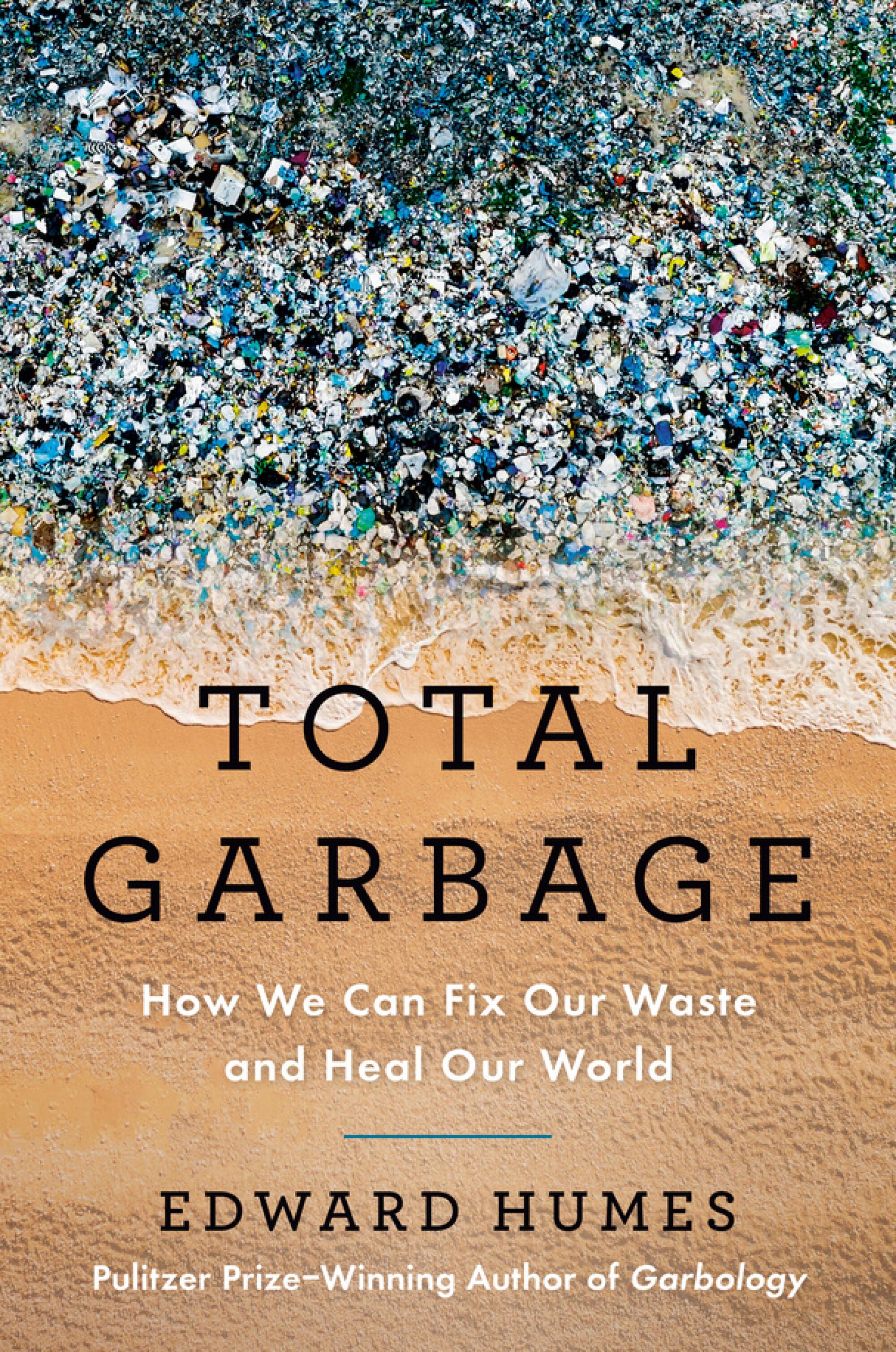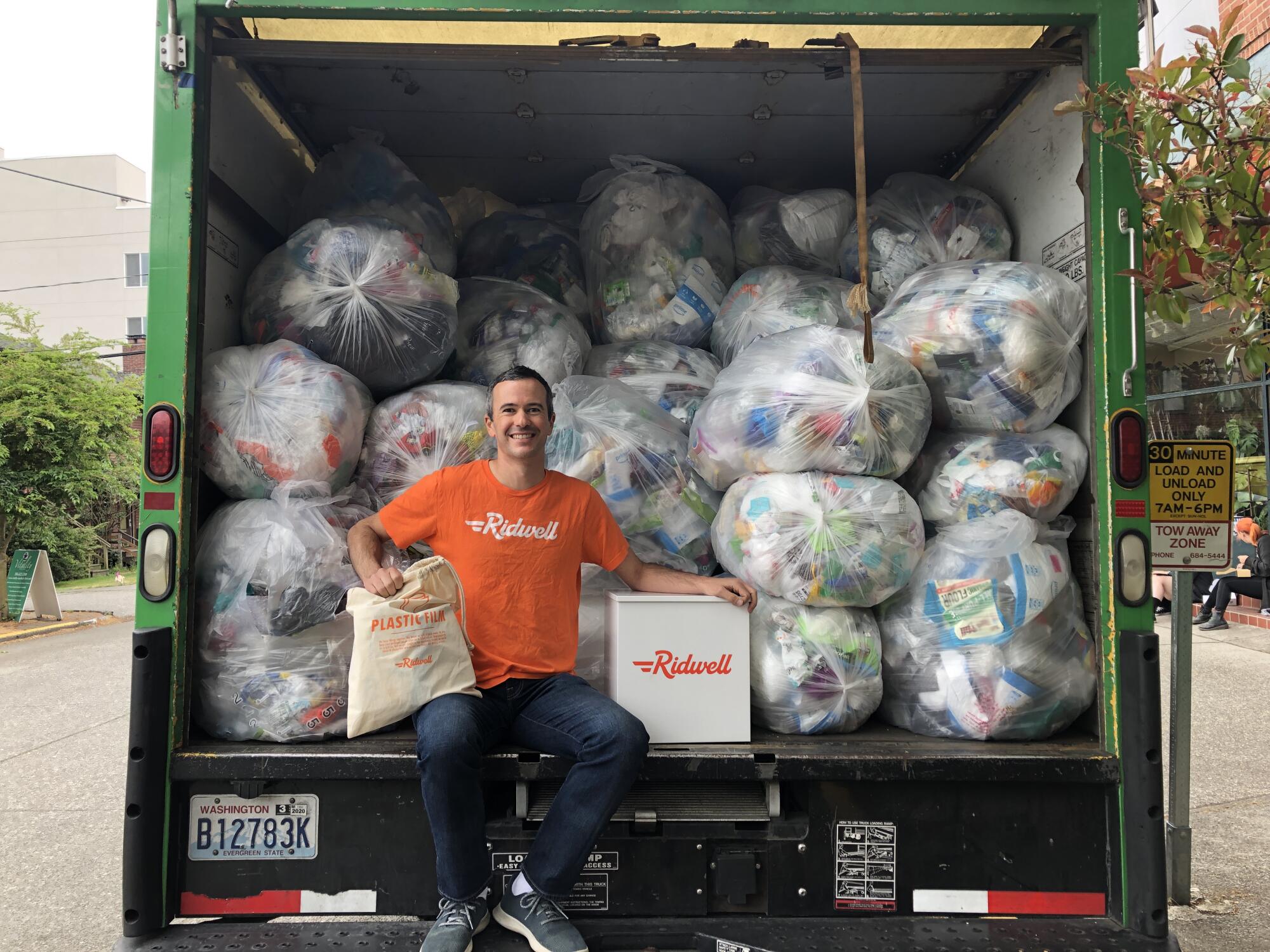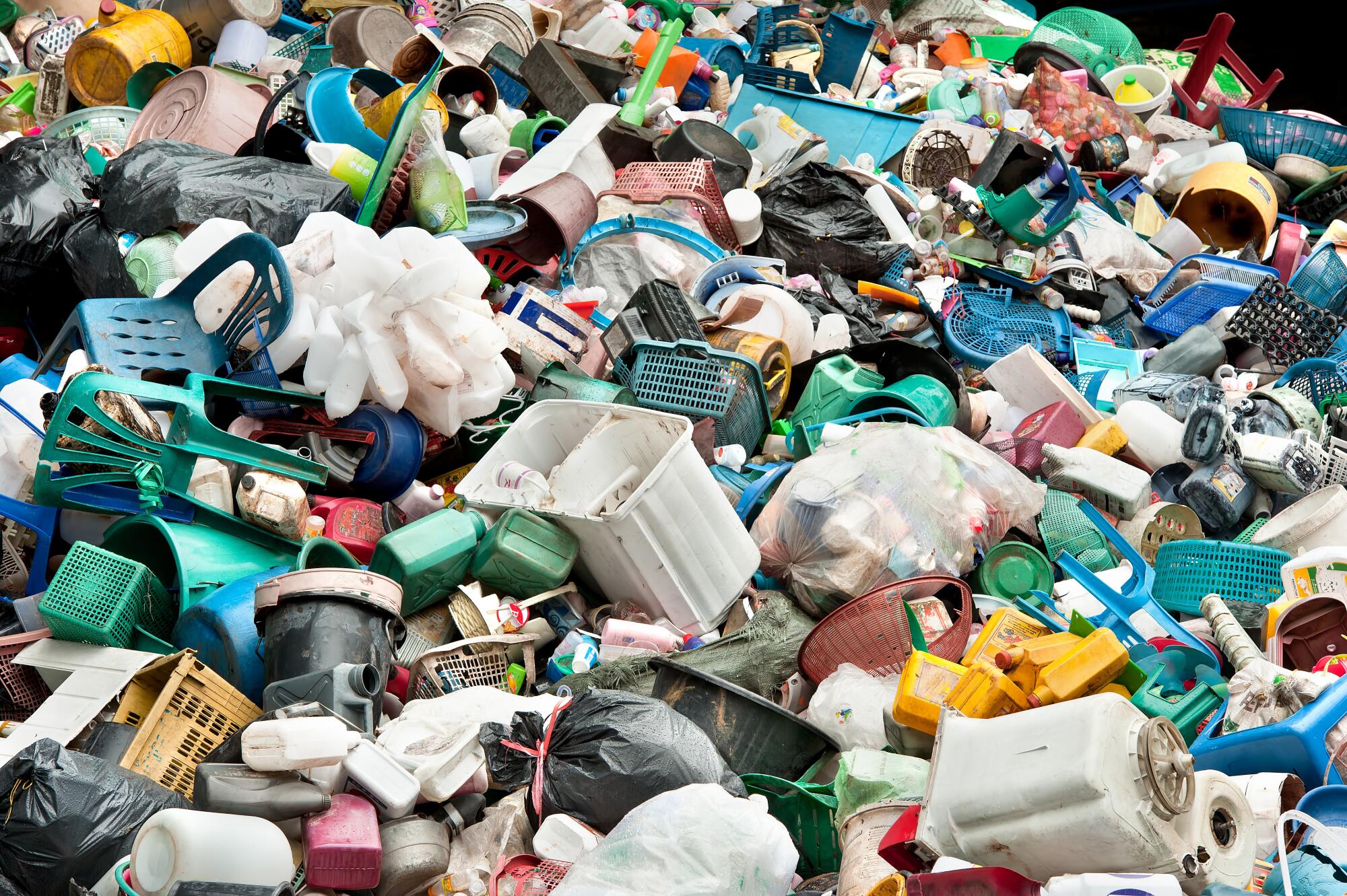
- Share via
Edward Humes thinks a lot about garbage — and how we should deal with it. “Garbology,” the Pulitzer Prize winner’s book on “our dirty love affair with trash,” came out in 2012, and “Total Garbage: How We Can Fix Our Waste and Heal Our World” was published earlier this year. This interview has been edited for clarity and length.
I’m hoping you can talk about Ridwell, the subscription service that focuses on reusing or disposing hard-to-recycle items and inspired a chapter in “Total Garbage.”
Humes: We lived in Seattle for about three years. Just at that time, Owen’s List, a father-and-son project, was transforming into what Ridwell is now. Ryan Metzger’s 7-year-old Owen had come home from school one day and said, “We’re learning about recycling. What about this bag of old batteries in our drawer?”
They knew they weren’t supposed to put it in the bin, but there was no easy way to deal with it, so Ryan called around and found a place to take them. They asked the neighbors if they had some old batteries to be recycled properly or disposed of properly or remade into new materials properly. And that became a thing, a father- and-son project.
[The collections expanded to include light bulbs, electronics, plastic bags and Halloween candy, and Owen’s List eventually morphed into Ridwell. Customers get a Ridwell bin and bags for collecting various items, which are picked up biweekly. Hard-to-break-down plastics usually have to travel farther to manufacturing plants that use them for outdoor structures such as decking and fencing and long-lasting drainage products. Prices start at $18 a month.]
When I met Metzger, one of the first questions I asked was, “So, once you get beyond Seattle, which is notable for its citizens’ commitment to green and climate measures, how’s this business model going to work when you ask people to give up two or three lattes a month just to have their trash more responsibly taken care of?”
He said, “Well, we consider it a success when we get 15% or 20% of a ZIP Code, and we can live off of that, no problem. And we think we can get it.”

Metzger has been proven right. Every community he’s expanded to since Seattle seems to be working for them. They’re in Atlanta. And they’re in Minnesota in the Twin Cities. Of course, L.A.’s the big kahuna now. They’re here.
When I first read about it, I thought, “At this point, it should shame municipal governments into adopting the model.” But for now, who’s likely to pay for the service?
Humes: It’s surprisingly affordable, but we are 10- and 15-dollared to death with, “Oh, Hulu.” “Oh, my kids want the Disney Channel.” “Oh, I really need that coffee, that overpriced latte.”
It’s just one more thing, and it really adds up over time, so it’s a big ask, actually. You’re taking the time to sort out things that you would normally just throw in one bin heading to a landfill.
Ridwell does, as you say, put the existing system to shame because they’ve become a sort of middleman. They’re intercepting [trash] before it ends up in the landfill or as plastic pollution that is sort of half-assedly recycled, which is what happens with most of our plastics. Six percent in the U.S., 9% globally of plastic is recycled. You might as well not even bother trying.
The cool thing about talking to Metzger is one of the first things he said to me: “Ideally, we’ll be obsolete someday. It’s just we don’t seem to be on that path right now. So in the meantime, we’re just doing what we can do.” And [Ridwell] does a lot of other things, like collecting old eyeglasses and getting them in the hands of unhoused people.
“Total Garbage” has a chapter set in the state of Maine, where a resident came up with an idea I’ll call “let’s make producers pay for it.” How did that work out?
Humes: Maine is the first state to adopt what colloquially could be called a polluters-pay law. Its official name is extended producer responsibility law, EPR. The idea is that if your product is creating harm in the environment, dealing with that, either by correcting the product or paying for the harm done, should be the responsibility not of taxpayers or ratepayers but of the producers who create the problem in the first place.
The idea in Maine is very simple, but it took eight years for one person, Sarah Nichols, then of the Natural Resources Council of Maine, to make it a reality. Again, it was another triumph of an individual with an idea, persuading others in one community at a time to embrace it and to work with her to make it happen.
She’s a young single mom — an outdoors person with an interest in sustainability. Her pitch was really simple: “Hey, I make my kids clean up the room when they make a mess. Why aren’t we making these guys clean up their mess?”
Interesting that it happened in Maine.
Humes: Maine has a citizen legislature and they’re part-timers. They’re not professional politicians. I mean, the head of the Republican Party in the state legislature is like a career lobsterman. But he got on board with this idea too.

The idea is to require disposable packaging and containers to actually be recyclable, as opposed to theoretically being recyclable. If the manufacturers and producers are required to foot the bill for making that happen, either they have to create materials that really are recyclable or they have to lean back into reuse, which is really the agenda that Sarah is hoping will be achieved. Or they’re just going to have a huge, new cost added to their cost of doing business, which they’re not going to be able to pass on to consumers.
Sarah was very astute. In every community she would visit, she found a local person who was either a prominent member of the community or a local leader of some kind, or just a really passionate citizen who was willing to enter the community governance process. That kind of local influencer getting behind a new idea, as opposed to someone from outside, makes a big difference in any community, but particularly in Maine where a lot of people know everybody else in these towns, and she began to get traction.
A big get for Sarah was meeting with the founder and CEO of the most popular craft brewery, Allagash Brewing, in Maine, where they like their beer. And he said, “We are making this problem and we should be helping be the solution. I’ll support this.”
That was a watershed. That’s why you get a bipartisan buy-in on this particular bill — because it made sense.
Has anyone asked her to try to export the concept to another state ?
Humes: About 30 states immediately wrote and asked for copies of the legislation. Other states have adopted similar programs. None of them have actually gone into effect yet, including Maine’s, because it’s years of rule-making and setting up a stewardship organization. And, of course, the lobbyists are fighting to water it down with each iteration.
The great fear, I’m sure, of the fossil fuel industry, which is looking to plastic as a way of extending their customer base, is that the EPR principle could be applied to almost anything and should be applied to almost anything.
Let’s talk about Morris, Minn., the topic of a chapter titled “Schooled.”
Humes: I’ll set the stage. Morris is a town of a little more than 5,000 people — the county seat of Stevens County with generations of farmers. It’s a very rural area and politically it’s quite conservative. But a relationship has evolved over time with the University of Minnesota Morris campus, which has about 1,500 students. You can’t miss the place when you are miles out because of the two enormous wind turbines on that campus.
What drew me to Morris was what seemed like an unlikely partnership between the university and the farmers of Morris County, which began with a composting operation for food and ag[ricultural] waste.
The farmers basically had been discouraged from going all in on composting because it’s too cold there and you need all this expensive equipment. But apparently somebody didn’t give that memo to the students at the Morris campus because they said, “Oh, we could do this.” And they started their own campus composting program.
It was so successful they started taking dropoffs from the entire community. All of a sudden they had a countywide, student-run volunteer composting operation that worked, and the farmers were getting all this great compost. They were getting rid of their organic waste without having to pay for dumping fees.
Eventually, after a number of years, the students donated what was now a treasured program to the county and said, “Take it over. We want this to keep going. We’re graduating, but there’s no reason why it has to die with us.” And it’s still running to this day.
It was like a “these kids are all right” moment, for the locals, and it led to a conversation between the town and the campus sustainability director, a guy named Troy Goodnough.
He [asked] about how else the town and the university might be able to partner. One of the things they came to him and said was, “Well, our budgets are tight and our electric bills are killing us. We saw you were doing something there.”
The campus had, years before it became the thing to do, converted to LED lighting for the outdoor and indoor lighting, saving a lot of money. So he said the university could help the town.

So, with a little technical expertise, a little grant-writing support and some hooking the city folks up with people who knew what they were doing in this space, they were able to get some funding and support for making that conversion.
By the time they were done, the town was saving close to $100,000 a year, which, for a small-town budget, was the difference between being in the black and being in the red, and being able to afford to do some other things.
None of this was about climate change. It’s about saving money, about being more efficient, about cutting waste. Those are virtues that are as apolitical as can be.
The town also knew that those wind turbines on the campus made sense because they were big when they were built, like 1.65 megawatts each. They generate four times the power the campus needs, so power was going into the local grid and bringing down rates for everybody.
They said, “Well, we don’t see us erecting any wind turbines in our town, but what about solar? What about geothermal?” Now every public building in Morris has rooftop solar, even the liquor store. And the local school district got it on the act with electric school buses, and the town has buses that are electric.
You’ve shared a lot of reasons for optimism in this conversation.
Humes: Yeah, I’d say so. I’m more optimistic having done this research than I was going in. I think creating the bigger tent that brings in communities you wouldn’t normally associate with taking steps to avert climate change is huge.
Which is not to pretend that it’s not a problem. It’s just finding the motivation to get people into that tent. And I think we need to be firing on more cylinders than we are. That was the point of the book, and I’m seeing evidence that we are doing that, just not enough.








